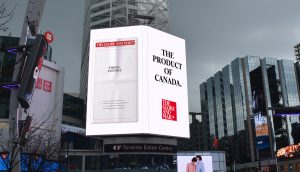You’ve probably heard that none of Canada’s seven NHL teams made it past the regular season this year, something that hasn’t happened in over four decades.
Scott Moore, president of Sportsnet and NHL Properties, Rogers Media, says the media co has been preparing for months for a post-season that he calls a “historic anomaly.” A time frame that the company was given since Canadian teams were out of contention earlier, and in greater numbers this year than they have been since 1970 (and even then the Winnipeg Jets and Calgary Flames weren’t part of the NHL, Moore notes). He said that the Leafs are typically in playoff contention until a couple weeks before the end of the regular season.
In conversation with MiC, Moore details why the current Canadian performance isn’t such a downer and details the company’s strategy in handling its coverage of the event.
The poor performances did, of course, have an impact on viewership. Overall, ratings for NHL games this regular season were down 15% year-over-year across Sportsnet and CBC broadcasts, according to Numeris numbers provided by Rogers Media. But digital didn’t take the hit for poor performance; it fared better, with subscriptions to Rogers NHL GameCentre Live up 51% for the season overall, with paid subscriptions up 45% versus last year. Users to the app are tuning in for an average of 5.9 minutes longer than last season, leading to an overall increase of 63% in average minutes viewed versus last year. Visitors to hockey content on Sportsnet.ca were up 15%.
The Toronto Maple Leafs took the hardest hit on TV. He says that regional Toronto Maple Leaf games were at a 10-year low and in the midst of a restructuring cycle, but fans still tuned in to see them on Saturday nights.
“When the Leafs were on Hockey Night in Canada they were down about 20%, but they were far more resilient than other teams,” he said. “Which speaks to the value of Saturday night hockey. Leaf fans definitely watched less of their team this year, but they still made an appointment to watch them on Saturday nights.”
Post-season ratings estimates have been downgraded accordingly to match the lack of Canadian teams, says Moore, but he notes he is “encouraged” by the sales he is seeing going into the start of this week’s playoffs.
Moore said last year’s introduction of the post season promo “Don’t Miss a Moment” was intended to highlight the league and its stars in the post-season, rather than focusing strictly on the Canadian teams.
“We started the promotion last year, because you always have this challenge,” he said. “With seven Canadian teams it’s mathematically impossible for them all to get deep into the playoffs.” But even they didn’t predict a scenario where not a single team would make the cut.
Given that reality, Moore said that Rogers has prepared a tweaked programming schedule for this year’s reality.
Rather than focusing entirely on one game, Sportsnet and CBC broadcasts will create more of a tournament feel, joining other games in progress during breaks in the action.
It’s what the Sportsnet team calls “March Madness feel.” “We will go between games more often, have more highlights. You will get a better sense of the tournament more than if we were focused on the Canadian teams on their own.”
To further the tournament feel and cut costs, Rogers has also combined the broadcast crews for the NHL Playoffs, rather than having one for the CBC and another for Sportsnet.
The combination of production teams also led to Gord Cutler, SVP hockey production, Rogers Media being let go. Moore said the decision is part of Rogers Media’s previously announced plans to cut 4% of its workforce, a process he said will be wrapped in late spring or early summer.
Knowing what he knows now, would Moore still be for Rogers signing a 12-year, $5.2 billion NHL deal? Yes, says Moore, who says he’s confident this year’s Canadian performance is an anomaly, not the rule. He also points to last week’s non-traditional broadcast deal between Twitter and the NFL, and the recent success of the Toronto Blue Jays after 20 years of lackluster performance as reasons the hockey pact makes sense long-term.
“If we had a three or a five-year deal then I would probably have a very different tone to my voice,” he said. “But we have a 12-year deal and there are ebbs and flows in sports. In three years when Toronto is playing Edmonton in the Stanley Cup Finals then it will be a very different story.”
An earlier version of this article said there were six Canadian NHL teams, but there are actually seven. We regret the error.

















